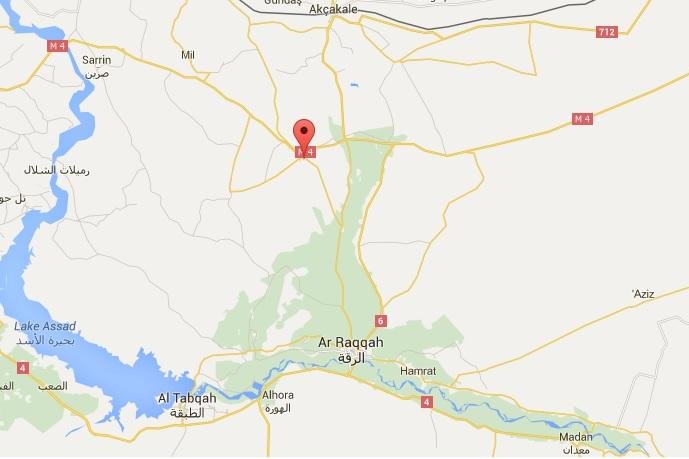Kurdish forces captured the town of Ain Issa, Syria, from the Islamic State on Tuesday, according to a human rights monitoring group. The strategic town lies on a crossroads 30 miles north of the Islamic State's self-proclaimed capital of Raqqa. Image from Google Maps
AIN ISSA, Syria, June 23 (UPI) -- Kurdish forces captured a strategic town north of the Islamic State's capital in Syria on Tuesday, according to a human rights monitoring group.
Known as Popular Protection Units, or the YPG, the Kurds have made several recent gains in territories north of Raqqa, Syria, capturing dozens of villages earlier this month before last week seizing the town of Tell Abiad. The town on the Syria-Turkey border represented a vital supply point for IS forces.
The YPG, backed by U.S.-led coalition airstrikes and allied rebel factions, have now taken Ain Issa, according to the Syrian Observatory for Human Rights.
The Britain-based monitoring group reports the town "has toppled militarily" in the face of the Kurdish advance, with IS fighters retreating to the outskirts of Raqqa, their de facto capital.
On Monday the Kurds took from IS forces Brigade 93, a former Syrian military base in the area, according to SOHR.
The Kurds' victory in Tell Abiad allowed them to link with forces to the east, toward Iraq, and to the west, in Kobani, where in January Kurdish fighters, backed by U.S. air power, defeated IS forces after a four-month battle.
The capture of Ain Issa represents a further strategic gain for the Kurds, as the city lies 30 miles north of Raqqa and contains roads leading toward IS-controlled territories to the east, in Hassakeh province, and to the west, in Aleppo province.
SOHR reports the price of bread and other foodstuffs in Raqqa has seen an increase due to the loss of the IS supply route in Tell Abiad, which has reportedly seen a drop in the price of such materials under Kurdish control.
IS reversals in northern Syria come as the Sunni extremist group is reported to be planting landmines and improvised explosive devices in the ancient ruins of Palmyra, in Homs province to the south. The Syrian military is reportedly building up troop strength in the area for a possible operation after IS forces seized the ruins in May.
The BBC reports that IS published photographs on Tuesday of militants demolishing shrines in the Unesco World Heritage site, saying they represented "manifestations of polytheism."
The IS capture of Palmyra had stoked anxiety the ruins would be destroyed as other ancient sites had under the charge of "idolatry," including the dismantling and bulldozing of archeological sites in the northern Iraqi cities of Nimrud and Mosul earlier this year. Officials say the group also sells artifacts on the black market to fund operations.















